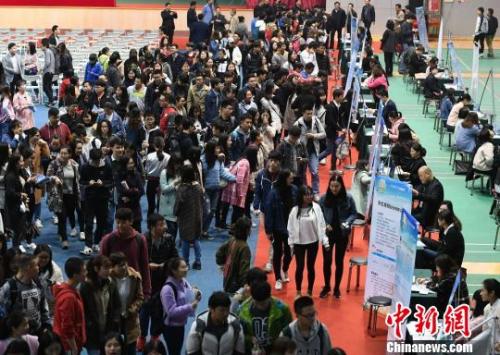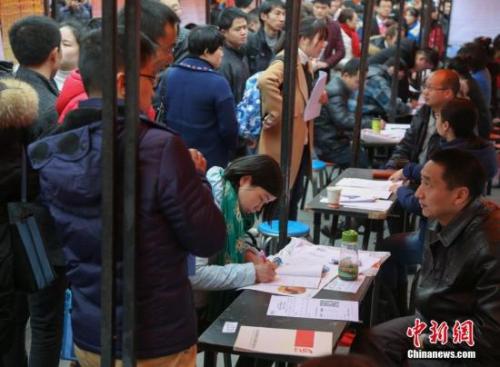Second-tier cities launch a "war of grabbing people": graduates can get 60 thousand subsidies for buying a house
BEIJING, Oct. 13 (Shang Qi) Recently, Wuhan released an upgraded version of the new policy for college graduates to settle down, in which policies such as "20% discount on house purchase and rental" and the introduction of minimum annual salary guidelines have aroused social concern. In recent years, in order to attract talents to take root, many second-and third-tier cities have given preferential policies to highly educated talents in terms of housing, hukou and entrepreneurial support, which is also called a new round of "grabbing people’s war" by public opinion.

Data Map: People who apply for and wait for settlement procedures in some government service centers such as Tianfu New District in Chengdu queue up for processing. China News Service reporter Liu Zhongjun photo
The settlement conditions are more relaxed
Recently, the "Notice on Further Relaxing the Trial Policy for Graduates from Chinese Universities" issued by the Wuhan Recruitment Bureau and the Municipal Public Security Bureau clearly stipulates that graduates from Chinese universities who are under 40 years of age can apply for registration as permanent residence in Wuhan with their diplomas, and master’s and doctoral students are not subject to age restrictions.
The news of "seeking talents and introducing talents" in Wuhan has become a hot topic of public opinion for a time. In fact, in recent years, many second-and third-tier cities in China have successively released "big moves" to attract talents, and issued various generous guidance opinions and measures for college graduates to attract talents.
For example, Chengdu’s "Rong Piao" plan this year promotes "settle down first and then get employment". It is understood that according to this policy, young talents with full-time undergraduate degree or above and skilled talents who have worked in the same employer for two years or more can apply for settlement procedures.
This year, the public security organs of Jinan also introduced a new policy of household registration system reform and household registration migration, comprehensively lowered the settlement standards, and stipulated that qualified college and technical secondary school graduates can settle in Jinan.
According to the data of the Ministry of Education, in 2017, 7.95 million people graduated from colleges and universities nationwide, an increase of about 300,000 over last year. For college graduates who have just entered the society, preferential employment policies in various places will naturally affect their job hunting planning.
According to a survey report on white-collar job-hopping index in autumn 2017 released by Zhaopin Recruitment in September, whether there is a hukou or not has a great influence on the level of urban belonging index. For job seekers, hukou, housing price, medical care and education are still important factors in their choice to stay in this city.

Data map: Many college students get together for job hunting. Photo by Yang Huafeng
Living allowance is richer.
Observing the policy of "attracting talents" in various places, if hukou brings some hidden benefits, then the subsidies offered by many cities to attract talents can be said to be "real money and silver".
According to media statistics, subsidies for talents in various places include trainee subsidies, skill level subsidies, training subsidies, etc., and the rental living allowance accounts for the bulk, and the threshold of subsidy policy is not high, so you can work locally and pay social security.
For example, Nanjing stipulates that graduates from full-time colleges and universities (including overseas students) who have obtained bachelor’s degree or above, technicians’ professional qualification certificates from full-time technical colleges, graduates who have been employed in the city within two years after graduation and signed labor contracts with a term of one year or more, and who have started their own businesses in Nanjing can apply for public rental housing with an area of about 30 square meters or a rental subsidy of 600 yuan to 1000 yuan.
This year, Hangzhou also issued the "Implementation Measures for the Payment of Living Allowances for Newly Introduced Graduates with High Education in Hangzhou", which stipulates that within one year after graduation, the graduate students will be subsidized by 20,000 yuan each, and the doctoral students will be subsidized by 30,000 yuan each. The application time limit is one year from the date of graduation, and they will be paid in one lump sum.

Data Map: At the job fair of Najie talent market in Wuhan, it was crowded with job seekers who came to apply. China News Service reporter ZhangChang photo
The purchase price is more favorable
For college graduates, considering where to "put their youth", the housing policies of various places are of course an important reference factor.
In the media’s inventory of the policies of "attracting talents" in various places, compared with other preferential policies, the preferential policies for buying houses are more related to the settlement policies. For example, the settlement policies in Xiamen, Qingdao, Jinan, Zhengzhou, Wuxi and other cities are relatively loose, and graduates are not affected by some purchase restriction policies after they settle down.
Taking Wuhan as an example, the city’s latest housing policy is clear, striving to let more college graduates who are studying in Han buy housing at 20% below the market price and rent rental housing at 20% below the market price, which is also interpreted by the outside world as "20% off for buying a house and renting a house".
In Chengdu, the city has put forward various ways and means to solve the problem of "Rong Piao" living in housing, such as talent apartments, supporting rental housing for industrial new towns and shift houses built by employers. In order to facilitate the fresh graduates from other places to apply for jobs in Rong, the city has also set up more than 20 young talent stations for free stay within 7 days.
Changsha will pay 15,000 yuan, 10,000 yuan and 6,000 yuan of rental and living allowances to full-time college graduates who work in the local area within two years; Doctor and master graduates who work in Changsha and buy houses for the first time will be given 60,000 yuan and 30,000 yuan housing subsidies respectively. (End)